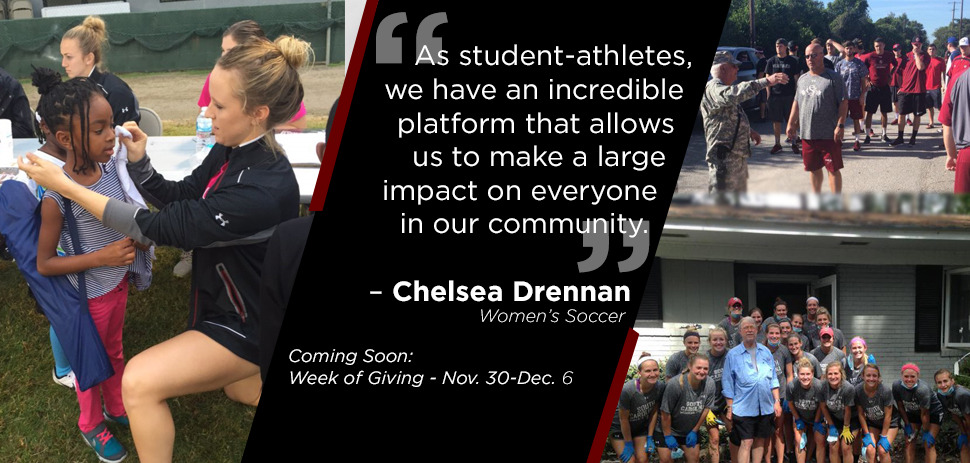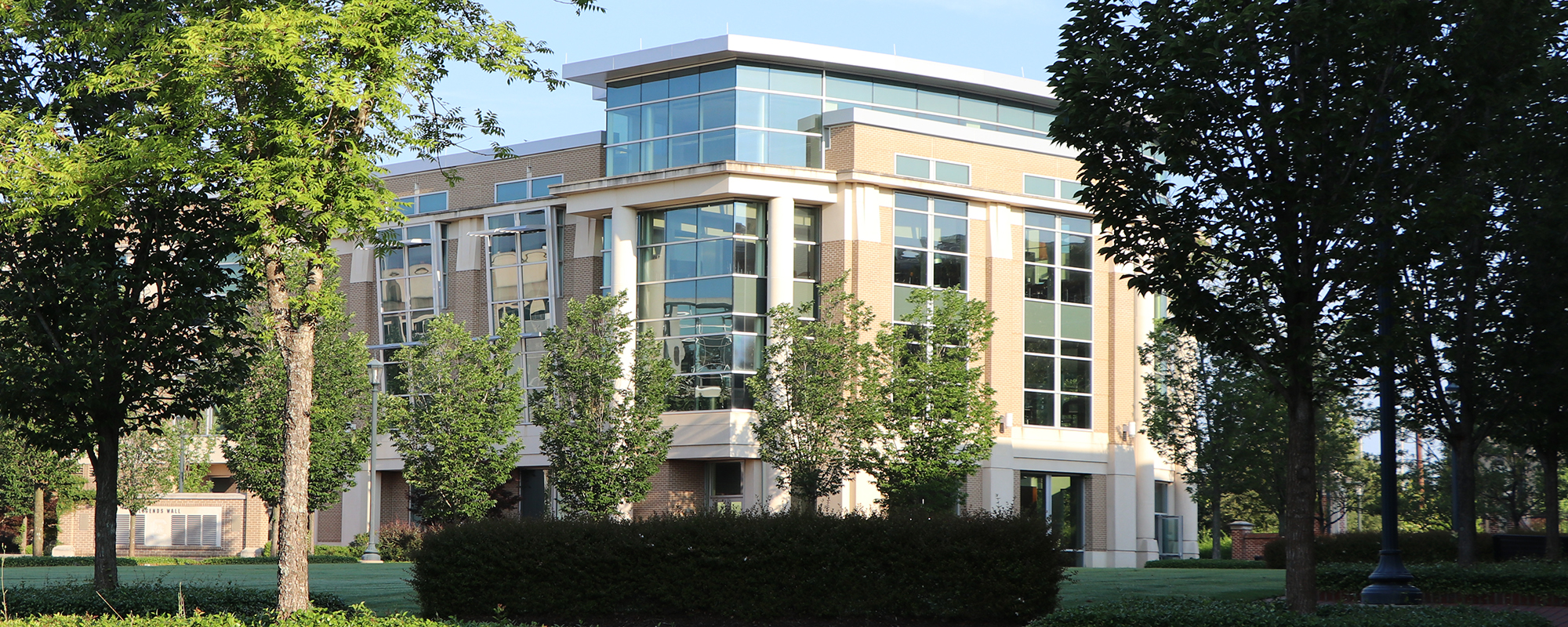
Gamecock Student-Athletes are in the Spirit of Giving
Nov. 24, 2015

As the holiday season approaches, the need for help in the community becomes more evident. For the third consecutive year, South Carolina student-athletes will be participating in the Week of Giving from November 30 through December 6 in the local community.
“It’s a week-long initiative,” said Erica Nelson, Director of Life Skills and Community Outreach. “I’d had teams ask if we are doing anything around Thanksgiving or Christmas for community service. So it seemed to be the ideal time and a space where teams and student-athletes can decide amongst themselves which activities they want to participate in. We’ll have an event with the American Red Cross. We’ll go to Harvest Hope Food Bank, Ronald McDonald House, Meals on Wheels, Palmetto Health Children’s Hospital and many others. In the past, we’ve done a Boy Scouts clinic with various sports stations.”
Community service is important because as student-athletes we receive so much support from the community that we feel we must give back and contribute to others, especially those who are less fortunate that we are,” said senior volleyball student-athlete Sarah Blomgren.
Several activities are set up for each of the seven days, and the student-athletes can do whatever fits their schedule and interests.
“It’s been great to strengthen our relationships and support the community,” Nelson said. “It’s a chance for our student-athletes to give back and feel good about it.”
The Gamecocks have been in the spirit of Thanksgiving for more than just the holiday season. South Carolina student-athletes are required to take part in community service efforts throughout the year, but more often than not, it doesn’t take much to get them involved.
“South Carolina student-athletes led the SEC last year by more than 3,000 hours,” Nelson said. “We did over 8,860 hours of community service. For us, it’s what we do. There’s not a lot of arm-twisting, and it’s up to each team. Some coaches say they want each student-athlete to do 10 hours per semester. Some say 20. Some teams really want to win the Team Community Service Award so they’ll ask what other teams are doing. For a lot of our teams, it’s so much a part of their culture, they don’t even need to set a minimum.”
South Carolina student-athletes have already logged more than 1,200 hours of community service during the fall semester and the number increases on a weekly basis and will jump even further after the Week of Giving.
“Women’s volleyball has really done a lot, even though they are in-season,” Nelson said. “They’ve been very impressive in making this a priority. Beach volleyball has done the same thing. Every Friday they do a different community service project, whether it’s Ronald McDonald House, Harvest Hope Food Bank, or going out to the farm at City Roots. They’ve really bought into it and make it part of their routine. Baseball has been very active too. They did a lot of stuff around the floods, as did a lot of our teams. They’ve been impressive.”
South Carolina student-athletes led the SEC last year by more than 3,000 hours. We did over 8,860 hours of community service. For us, it’s what we do.
Erica Nelson, Director of Life Skills & Community Outreach
“They love to do it,” said head volleyball coach Scott Swanson. “We’ve never had to talk them into it. They really want to be the team that has the most service hours. We won that three years ago, and they were extremely proud. They were upset when they finished second last year. So it’s one of their goals every year, and as a coach, the makes you feel good to know they want to be competitive in all that they’re doing – good grades, good athletic performance and being great in the community.”
Department policy is for every team to do some service through the year, and many student-athletes seek out service opportunities beyond the organized team efforts.
“I would say there is more of that than there are team-organized activities,” Nelson said. “It becomes infectious. There may be some kids that have never done it before, but when they see an upperclassman do it, then they do it. It gives them a sense of pride and accomplishment that they are giving back. I have an email list for student-athletes to hear about opportunities. It’s definitely part of the culture here. I mention that to recruits when they come in here.”
In addition to helping the elderly, the homeless, and the hungry, the Gamecocks had additional opportunities to help out in the community after the recent floods in the Columbia area as 17 different teams were involved in early recovery efforts and those teams that were out of town got involved later.
“There were house clean ups, assistance with donated goods, a lot of water distribution, some worked at a call center, and some assisted at various shelters that were set up,” Nelson said. “With school not going on that week, a lot of the student-athletes were watching the news, and they wanted to help. That was a chance for them to really get out and support the community which is supporting them so passionately. I not only had student-athletes asking how they could help, but I also had former student-athletes calling and asking how they could help. That was very humbling.”
“Helping the flood victims this past month was such an overwhelming and heartwarming experience,” sand Chelsea Drennan, a junior on the women’s soccer team. “It sort of put things into perspective for me, it made me realize that in a few hours everything can be taken away from you. As a team, we want to be able to help out in the community and show that soccer isn’t our only priority in life. It was definitely a life changing experience for me, because I have never been a part of a natural disaster like this. To see a state come together as one to support our city was mind-blowing to me, and not only from our state, but from the entire Southeastern Conference. We feel that it is our role to help others out, not an obligation.”
Sometimes the service hours aren’t as labor intensive, but they’ve found that simple things such as writing letters to soldiers stationed overseas, serving the homeless meals at Transitions, or just spending time with the elderly can make a big impact.
“It’s been everything from sorting food down at Harvest Hope Food Bank to playing Bingo with seniors to helping pack water for the flood victims,” Swanson said. “They are open to just about everything. Some really enjoy being around pets, so they’ll do some work at local pet shelters. Every road trip we go on, we also ask the hotels for extra soap and shampoo that we can take home to donate back into the community.”
“We strive to make an impact in our community,” Drennan said. “This is important to me because I believe it is my role to serve others, whether that is playing soccer with young kids or tearing down houses from flood damage; every little thing puts joy into someone’s life potentially. As student athletes, we have an incredible platform that allows us to make a large impact on everyone in our community.
“As a team we believe this is important because we don’t only want to be recognized as being the best in the country on the field, but off the field as well. Whether that be in school or serving others in the community, we want to be well-rounded individuals that are not only known for our skills on the field. It is a privilege that we get to help this community out on a daily basis, and make an impact on other’s lives.”












